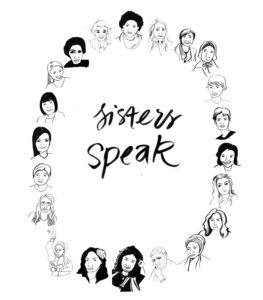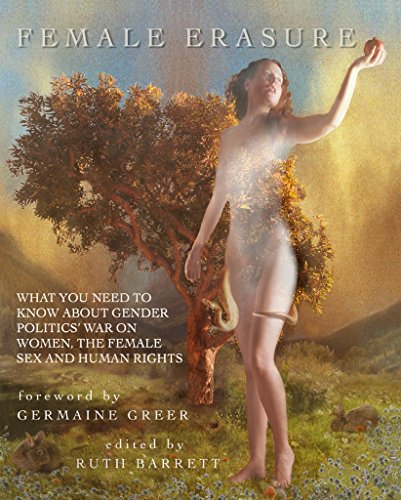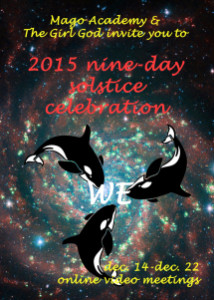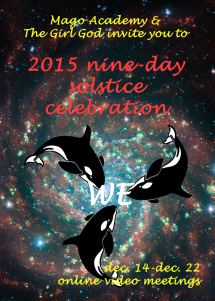In light of the attacks Dianic priestess and elder Ruth Barrett has been experiencing from transgender activist allies, I want to ask the larger community of Witches and other Pagans, the majority of whom disapprove of tactics being used against Ruth, to think about what we can do to put a stop to bullying in our communities.
The objection most Witches express about “getting involved” is that these campaigns by trans activists to silence and marginalize Dianic Witches are about a disagreement between between trans activists and Dianic Witches: it has nothing to do with them. Research on the dynamics of bullying, however, highlights that there are always three parties (at least) involved in a bullying situation. These three parties are the bullies, the victims, and the bystanders. The situation is complicated by the fact that bullies invariably see themselves as victims, and victims may or may not have insight into what is happening to them. You can’t go by what people say; you have to look at actions. Bystanders believe that by supporting bullies, by covert speech or careful silence, they will avoid being a target. In the short term, this is true. But the more effective bullying becomes, the more widespread and pervasive it becomes. Also, it is morally wrong not to care about the victims, just because they are not you.
The only way out of this morass is to move away from subjective feelings of persecution, subjective feelings like If you express disagreement with my belief system, I could kill myself or When I hear about men killing trans women, I feel like they must have been inspired by lesbian feminist witches or If I allow free discussion of ideas about gender, I am a poor trans ally and responsible for the murder of millions. We must stop validating feelings asserted without evidence or coherent analysis and look at specific behaviors. The behaviors that especially deserve scrutiny come under the heading of no-platforming.
No-platforming is a coercive set of tactics designed to silence an individual or group. It involves censorship, but censorship can be subtle or systemic while no-platforming is narrow and blatant. It utilizes strong-arm tactics promoted not by an authoritarian government but by a group of people. It is a more democratic way of shutting people up. The term apparently originated in the 1970’s in Britain, where it was at first narrower in execution and target (exclusively against fascists of the old-school variety). Like most social phenomena, the practice predates coinage of the term. Despite being purportedly progressive, groups that indulge in no-platforming tend to be white, college educated, and male-led.
Blacklisting is the most familiar no-platforming tactic. It was used during the McCarthy era by the US government and unofficial anti-communist groups to deny writers, actors, artists, and academics the opportunity to perform, exhibit, publish, or teach. It has been used in recent years to ban Dianic feminist Witch Z Budapest from venues for leading ritual and to try (unsuccessfully) to keep Australian feminist Sheila Jeffreys from publishing her book Gender Hurts. A closely related censorship tactic is that of the organized boycott, which can be a mode of consumer speech about things like unfair labor practices and environmental damage, but which can also be used to suppress speech. An example of this would be the boycott many groups have organized against performers and vendors at the Michigan Womyn’s Music Festival over the years. To (try to) force the Festival’s expression away from women-born-women experience, a T-shirt vendor was denied lgbt business as punishment for printing shirts with a Festival slogan, and musicians lost gigs as punishment. One group that had stopped playing at Michigan found their concert disrupted by trans activists who insisted they apologize for having ever played there. Destroying venue has become a standard tactic for censoring feminists. A trans woman activist employed at a women’s studies department and others led a campaign to harass a 2012 London feminist conference that resulted in the group losing meeting space. The tactic was successfully repeated the following year by Men’s Rights Activists, getting venue canceled at the last minute for another London feminist conference. These conferences were ostensibly censored because trans women and men were asked not to attend as part of the women-only policy, but the following year a radical feminist event was held in Portland Oregon that welcomed trans women and men, and trans activists convinced the Quaker group renting the meeting space to cancel the venue. These trans activists evidently felt that what they had not yet heard should not be spoken. Several months earlier, a Canadian feminist conference met in an alternate location after having its venue pulled, when a trans activists issued a threatening campaign that raised concerns for safety. Violence and threats of violence are a time honored way of enforcing censorship. The Internet is infamous for suppressing the speech of women, feminist or not, with death and rape threats. This form of censorship, usually anonymous and unorganized, is way too extensive to go into here, but one thing that should be noted is how the larger communities reinforce this censorship tactic by their response to it. When Ruth Barrett disclosed in 2013 that she was receiving threats, one of the few Pagan news sites that reported on this said it would be a terrible thing “if it were true,” implying that of course she was probably lying. Needless to say there was no investigation by that publication or any other into her allegations. It was enough to imply that a woman, particularly a feminist, particularly a lesbian, particularly a Dianic, might be lying. This type of reaction encourages violence and even censors a woman’s impulse to talk about what’s happening, lest it be implied she’s a liar.
Then there is the targeting of advertisers with boycotts to get articles suppressed from magazines, the manufacture and mindless re-blogging of incendiary untrue accusations that can be easily researched, and the deletion of WordPress blogs, Tumblr blogs, Facebook accounts, and Twitter accounts that have not violated any stated policies but which nevertheless offended some anti-feminist. You’ll have to take my word for it at this point or will be here all day – there are too many examples even to fill a large book. Obviously these strong-arm censorship tactics cannot be blamed solely on the Pagan community but are part of a wider anti-feminist culture, with trans women usually the purported beneficiaries. Trans women who speak out against these tactics are strongly criticized or even no-platformed themselves. Yet if Paganism is not the source of this brand of anti-feminism, it is surely a participant, and it has become, like Christianity and Islam, a tool for women’s oppression. If we cannot speak freely, women’s liberation cannot move forward, and we will surely move backward.
While of this outlining of what no-platforming is, it’s important to delineate what it isn’t to avoid confusion and misinterpretation. First and foremost, choosing to meet with others of your kind, while it is exclusionary by definition, is not necessarily no-platforming or even censorship. The reason feminists have protested the male-only country clubs is that most business and political deals (in the US at any rate) are conducted on the golf course, with offices only used for working out details. No company mergers or party nominations occur in women-only space, I can assure you: women don’t have that kind of power. The issue with women-only space is that quite often, for reasons having to do with male versus female socialization, women cannot speak freely and comfortably to other women if men are present. The same dynamic holds with trans women, even if they identified as girls while they were being treated as boys during their childhood. If you feel bad for not getting a chance to speak in a group that isn’t about you, you aren’t suffering from no-platforming: you’re suffering from an outsized sense of entitlement.
Name-calling, which no one really defends, is not the same as no-platforming. Hurt feelings are simply hurt feelings, and grown-ups don’t try to control others to defend their fragile egos. Demonstrations or protests are not a no-platform tactic, unless they disrupt an event with their aggressiveness to the point police need to intervene, as occurred when author Christine Benvenuto appeared at a bookstore to plug her memoir about her divorce from her transgender spouse. Starting a petition, even a petition you disagree with, is not censorship unless that petition is promoting censorship or contains errors of fact. Truthfully calling attention to someone’s lack of credentials, lack of competence, or unethical behavior may result in loss of platform but it is not no-platforming. Taking legal action against someone for no-platforming tactics, assuming the plaintiff has the facts straight, is not no-platforming. In fact, all of the no-platforming tactics I’ve enumerated are illegal in the United States. Every one of them. Some of them are difficult to prove or prosecute, and the role of social media has not been delineated by the courts, but the higher courts have taken an extremely dim view since the McCarthy era of tactics designed to suppress political speech.
Yes, but, what else can be done about this, since nobody likes the courts except on TV? We need to concretely, coherently, explicitly condemn no-platforming tactics. Every Pagan organization, tradition, school, conference, gathering, publisher, and news blog needs to issue a statement condemning the practice. It is long past time. Pagan conferences and gatherings need to extend invitations to controversial speakers and performers. Pagan news blogs need to do some real journalism and move out of he-said/she-said reporting by actually doing interviews and fact checking what people say. Facts have become offensive in the current political climate, but the more no-platforming tactics are catered to the more widespread they become. People keep using a tactic because it works for them.
Beware of gadflies: people who attract attention by spreading lies or pulling stunts to silence others. I’m not saying to no-platform the no-platformers, exactly, but don’t reward someone with a place in the debate solely because they tried to silence someone else. Most people build a media or activism platform through years of work; libel and censorship should not be rewarded as a short-cut.
Finally, don’t assume that anyone knows that you support a person who is being silenced if you don’t speak up. Comment on social media or on a blog, or send a private message if you are too afraid. You can say something simple like “I honor Ruth Barrett’s contribution to Witchcraft and feminism and like hearing what she has to say.” Supporting someone who is being targeted doesn’t mean you are seen by any sane person as endorsing everything they have said or done or might do. You don’t have to qualify it or justify it. Bullying is something you don’t have to go along with.
Imagine what it would be like if we could all speak our mind knowing that if people disagree they cannot retaliate with the implicit endorsement of other Pagans. Imagine what it would be like if feminists could get back to the work of helping women instead of fighting just to meet on our own terms and set our own agenda. Imagine what it would mean for people doing the thankless work of putting together conferences and gatherings to stop getting these demands to remove so-and-so from the program because somebody got offended over somebody else’s opinion. I wonder what these organizers thought when the trans ally mafia called last week warning them not to have Ruth Barrett on any program, in case they might be considering it. If Ruth does decide to sue, the subpoenas are going to start flying and every Pagan who has organized anything is going to get one. Lawyers are like that. Imagine our sordid lunatic Pagan communities under the spotlight for public scrutiny (and judgment). The media circus would make Z’s arrest for reading tarot cards look like a child’s birthday party. Even if this particular incident doesn’t end up in the courts, that is where things are heading, unless Witches and other Pagans put the brakes on this no-platform game and make it clear that the rest of us are NOT playing along. Even now, it may be too late.










